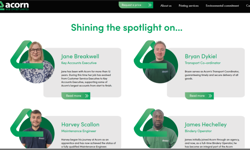We’ve all been there. Five days to go before the audit issue, five thousand shortfall in registered readers. What do you do? Well of course there is only one thing to do – get your telemarketing company on the job.
No doubt this scenario has been played out up and down the country over the last month and will be repeated next April / May. The trouble is that it encapsulates most of what is wrong with our approach to telemarketing; namely it is a last minute panic move shot through with unreasonable levels of expectation. Matthew Binley of BCC Marketing says "telemarketing works most effectively when enough time is provided prior to the audit issue date."
Right people, right product - result!
Having spoken with four of the leading suppliers of telemarketing services to publishers, it is amazing to what extent they all tell the same story. On the theme of how publishers can get more out of telemarketing their thoughts were spookily similar.
Whether you decide to handle it in-house or outsource, it is critical to pick the most appropriate people to do the calling. One common skimp is to get your customer service team to try a bit of telesales (they’ve got a telephone after all). The problem is that the skill set that makes a good customer service clerk is a million miles away from that of a good telesales operator. Recognising that it is a sales job gets you half way there, but you also need to get the tone right; as Phil Morgan of Subscriptions Marketing points out "there’s no point in a "bit of a geezer" working on a "high class" title, in the same way a very well spoken caller will not work on a "lads mag". If you have an in-house telesales operation already then keeping it in-house makes sense, although beware demoralising your ad sales team with subscriptions sales; the £45 renewal is just not going to make their earth move.
Assuming that you are going to out-source the telemarketing then make sure you pick an agency which specialises in circulation work. There is no shortage of generalist telemarketing companies but there is only a handful which specialise in circulation work and who will bring the level of experience and quality consultancy to the project. Choose the right agency and they will add real value to your planning phase. Says Kevin Farrell from CTC Telemarketing, "choosing a non-specialist agency can only lead to poor experiences and an aversion to the method".
When using a telemarketing agency try to involve them right from the start; ideally during the planning phase. The chances are that everything you are trying to do with your campaign will already have been done by them many times before and they will be able to bring a wealth of valuable experience to the table. It is in their interests to make your campaign work. They are chomping at the bit to give advice, so take advantage. Whilst you might not take up all of their suggestions the chances are that their early involvement will produce a more coherent and successful campaign. In short be more demanding – if all you expect them to do is to follow the brief set by you, then you are not only making extra work for yourself but you are not getting best value for money out of them. Campaign consultancy is one of the services you should expect from your agency.
Planning makes perfect
Generally speaking telemarketing works best when you get three key things right: campaign planning, good and plentiful data and a strong offer.
Good planning will set the tone for all that follows. Involve the telemarketing agency from the start and schedule all of your activity in an orderly fashion making sure to use each of the media to their optimum. Too often telemarketing is seen as a safety net to be used only when all else fails. The need for 10,000 registrations one week before the audit issue is fairly typical. Proper planning would have identified anticipated shortfalls and would have enabled you to phase your telemarketing over a six month period meaning fewer sleepless nights for you and a greater chance of hitting your targets.
Telemarketing works best when it is conducted in conjunction with other marketing activities; avoid cold calling if at all possible. Indeed the warmer the call the better the likely response. When selling subscriptions Kevin Farrell identifies two of the best prospect groups as being promotional and competition entrants and responders to reader offers. These people already have an association with the title and are more likely to respond positively to a sales call. For the same reason lapsed lists and sample copy requesters usually offer good returns. The words "in conjunction with" do not mean "after". Telemarketing does not have to be the last stage of the campaign.
Indeed as Richard Smith of Ant Marketing says – the phone call should be made early, "not after innumerable email, direct mailing and insert campaigns". There is a growing body of opinion in favour of early calls especially in the area of renewals; you can cut down on the amount of renewal efforts you send, you can avoid mailing grace issues to non-renewers thereby reducing your fulfilment costs and improving RoI.
Quality comes first
Which all brings us nicely to data. Data, data, data – ho-hum – everything boils down to data. Direct mail, email, fax and telemarketing all ultimately sink or swim on data quality. So don’t expect telemarketing agencies to produce miracles with duff data, because it won’t happen. As with any other type of direct marketing, data must be relevant, recent and in sufficient quantity to give the agency a chance to meet targets. Richard Smith identifies "insufficient data to achieve goals" as one of the main causes of campaign under-performance. The two things a publisher must ask themselves before a telemarketing campaign are, firstly how much response is needed and secondly what is the likely response rate to this campaign. The first question you can answer alone, the second you should put to your agency. Armed with these two bits of information and your O level maths you can work out how much data you need. A target of 5,000, a likely response rate of 15% and a data supply of 6,000 names spells disappointment.
Give thought to the offers you want to make over the phone. Kevin Farrell warns against the "tendency to use existing offers that have performed poorly via direct mail or on the page". Phil Morgan suggests that a "heavy discount for an initial trial period – followed with a higher ongoing rate – can be very attractive". Offering a premium can also be effective although Morgan advises against offering a choice of gifts since this tends to confuse and gives the potential subscriber an opt out for time to decide. It all boils down to supporting the telesales team – giving them as many tools to do the job as possible.
Everything mentioned above can be got right, right now – or at least next time you do a campaign. There are other factors which affect telemarketing response rates which relate more to company culture and as such are harder to get right, though still worth a try. Richard Smith points out that a track record of good quality customer service can make an appreciable difference. If the customer already feels valued (they get queries responded to promptly and courteously, they get welcome letters when they subscribe and thank you letters when they renew) then it is that bit more likely that they will give the telesales guy time to sell to them.
Time to get real
Many a telemarketing campaign has floundered on the back of lost causes. I have yet to meet a controlled circulation publisher who doesn’t dream of subs. There are many examples of successful free-to-paid conversion campaigns but much larger numbers of failed attempts. Realistic expectations are essential. You would like subs, but is your editorial really good enough to justify it? Your title is in a market already swamped by free titles equally as good as yours – are people really going to pay for yours? Wishful thinking is all very well, but where it leads to a calamitous campaign it tends to give telemarketing an undeservedly bad name.
Telemarketing is an extremely responsive and flexible tool and remembering that fact will enable you to get more of it. As Kevin Farrell says "within a few hours, you can gauge how well it’s going and if the feedback says ‘badly’ then stop and regroup." This responsiveness also allows you to test your offers to a much greater extent than with direct mail; give one team one offer and give another team a different one – get them both calling for a day and assess the results. Depending on what you see then you have the option of switching both teams to the same offer for the rest of the campaign.
If you had to remember one bit of advice it would be this: choose a specialist agency and talk to them as soon as possible.
FEATURE
Getting the most out of telemarketing
"Last minute, unplanned and expecting miracles" just about sums up many publishers' attitude to telemarketing. But it could be so different. InCirculation talks to four leading suppliers to see how the relationship between publisher and their chosen telemarketing agency could be made more mutally beneficial.










